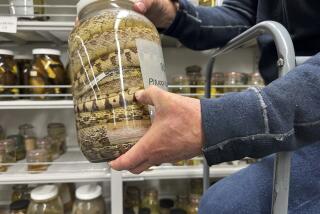Reptiles
- Share via
Which reptiles have been around since the days of the dinosaurs? How do you make a pond that a turtle would like to live in? What snake can grow 30 feet long? There are about 6,500 species of reptiles in the world, from scary dragons to great pets, all of them coldblooded creatures whose body temperature changes along with their environment. Want to learn more about reptiles? Use the direct links on The Times’ Launch Point Web site.
https://www.latimes.com/launchpoint/
Here are the best sites for getting your schoolwork done or for just having fun.
Level 1
Bill Nye, the Science Guy: Reptiles: Learn the basics about reptiles and find out what it means to be coldblooded through an easy experiment.
https://nyelabs.kcts.org/ nyeverse/episode/e38.html
Grade 6’ers Write About Sea Turtles: Unlike the dinosaurs, sea turtles survived the Ice Age and have been around for more than 100 million years. Learn about these creatures through an essay, pictures and poems.
https://www.turtles.org/6dessay.htm
Worldwide Reptiles: The largest snake in the world is the anaconda. Discover some interesting facts about crocodiles, alligators, lizards, turtles and, of course, snakes.
https://www.yamhillesd.k12.or.us/ user/EwingYoung/reptile.index
Level 2
The Crocodile Files: Did you know that crocodiles are considered the most intelligent of all the reptiles? Hear a crocodile “talk” on this site that details the history and myths surrounding these fierce creatures.
https://www.envirolink.org/ oneworld/tales/crocs/
General Information on Turtles & Tortoises from CTTC: Learn how to take good care of turtles and tortoises and what to do when they lay eggs. Find out what plants you can grow in your backyard that tortoises enjoy and about what efforts are being made to preserve these creatures in the wild.
https://www.tortoise.org/ geninfo.html
Ronda’s Rattlesnakes: Rattlesnakes are smart; they can figure out mazes as fast as a rat. Slither your way through this site and come upon some amazing facts about these venomous reptiles.
https://www.syspac.com/~varney/NETSCAPE/ rattlesnake/rattler-index.html
Level 3
Reptiles: Learn about alligators, lizards, snakes, turtles and a special type of lizard-like reptile called the tuatura that has a beak-like jaw and three eyelids.
https://sciweb.onysd.wednet.edu/ sciweb/zoology/herpetology/ reptiles.html
Reptiles Online: An assortment of reptile resources. Explore the Reptile Roundup to see what various lizards, snakes and turtles look like. Read the latest reptile news, send in your favorite reptile story or find out the answers to such questions as whether you can tell how old a turtle is by counting the rings on its shell. (Answer: Sort of.)
https://www.animalnetwork.com/ reptiles/default.asp
Melissa Kaplan’s Herp Care: What should you know if you want to have a snake as a pet? This site cautions the would-be owner as well as explains proper care for a number of reptiles. This site features extensive articles on herpetology, the study of reptiles and amphibians.
https://www.sonic.net/ melissk/index.html
Launch Point is produced by the UC Irvine department of education, which reviews each site for appropriateness and quality. Even so, parents should supervise their children’s use of the Internet. This week’s Launch Point was designed by Cynthia Quindipan, Aimee Tolentino, Anna Manring and Stan Woo-Sam.
EXPLORER’S QUEST:
QUESTION: What is the difference between an alligator and a crocodile?
CLUE: See Reptiles
Find What You Need to Know: Have a project on California history coming up? Need help getting a math problem done? Launch Point now covers nearly 40 topics for getting your schoolwork done. Go to https://www.latimes.com/launchpoint/ for the full list of subjects and direct links to the best Internet sites.
Answer to last week’s Quest: The best flying conditions for migrating birds are when there are “tail winds” (the wind is at their backs), clear and starry night skies and warm temperatures.


